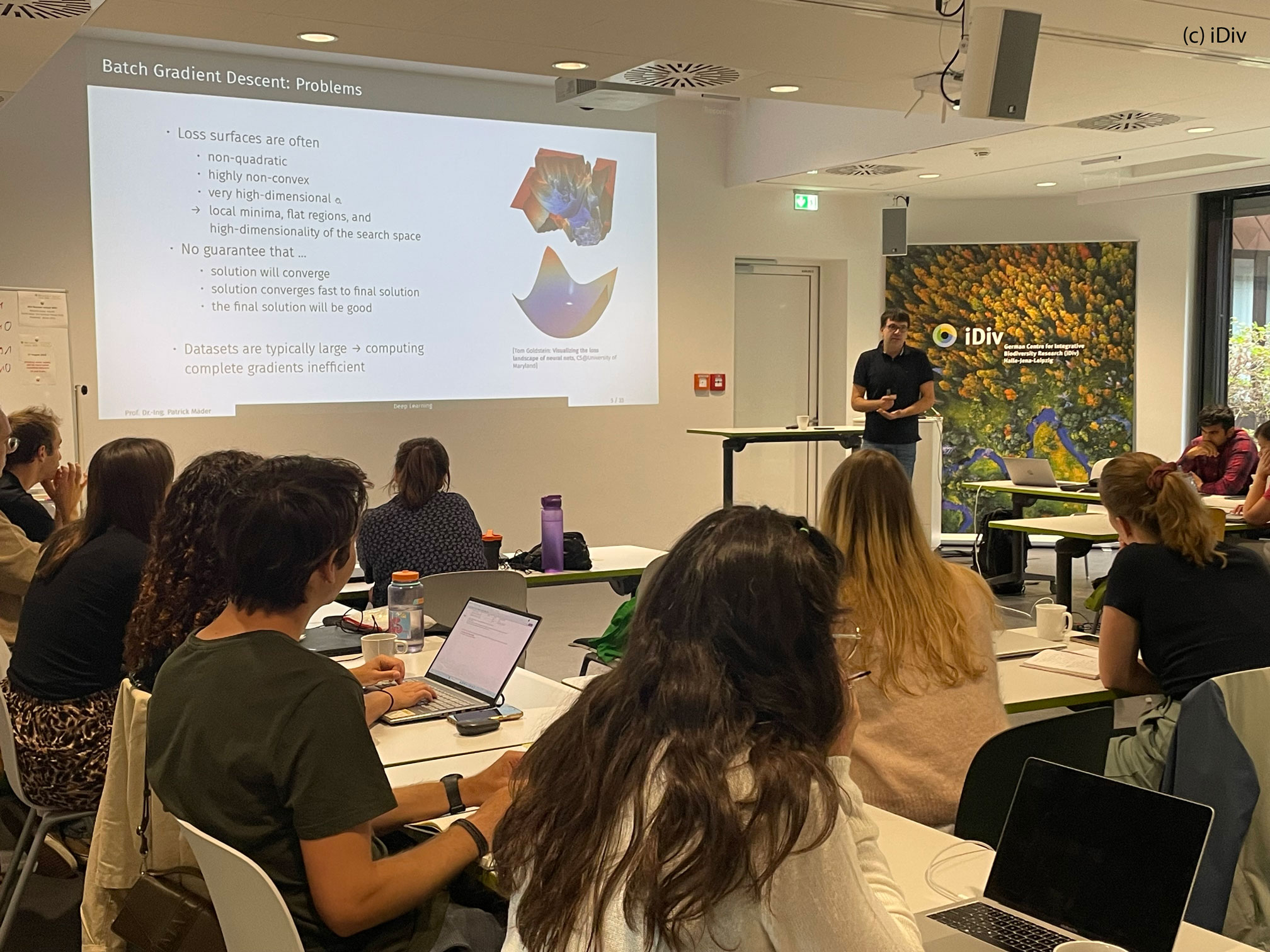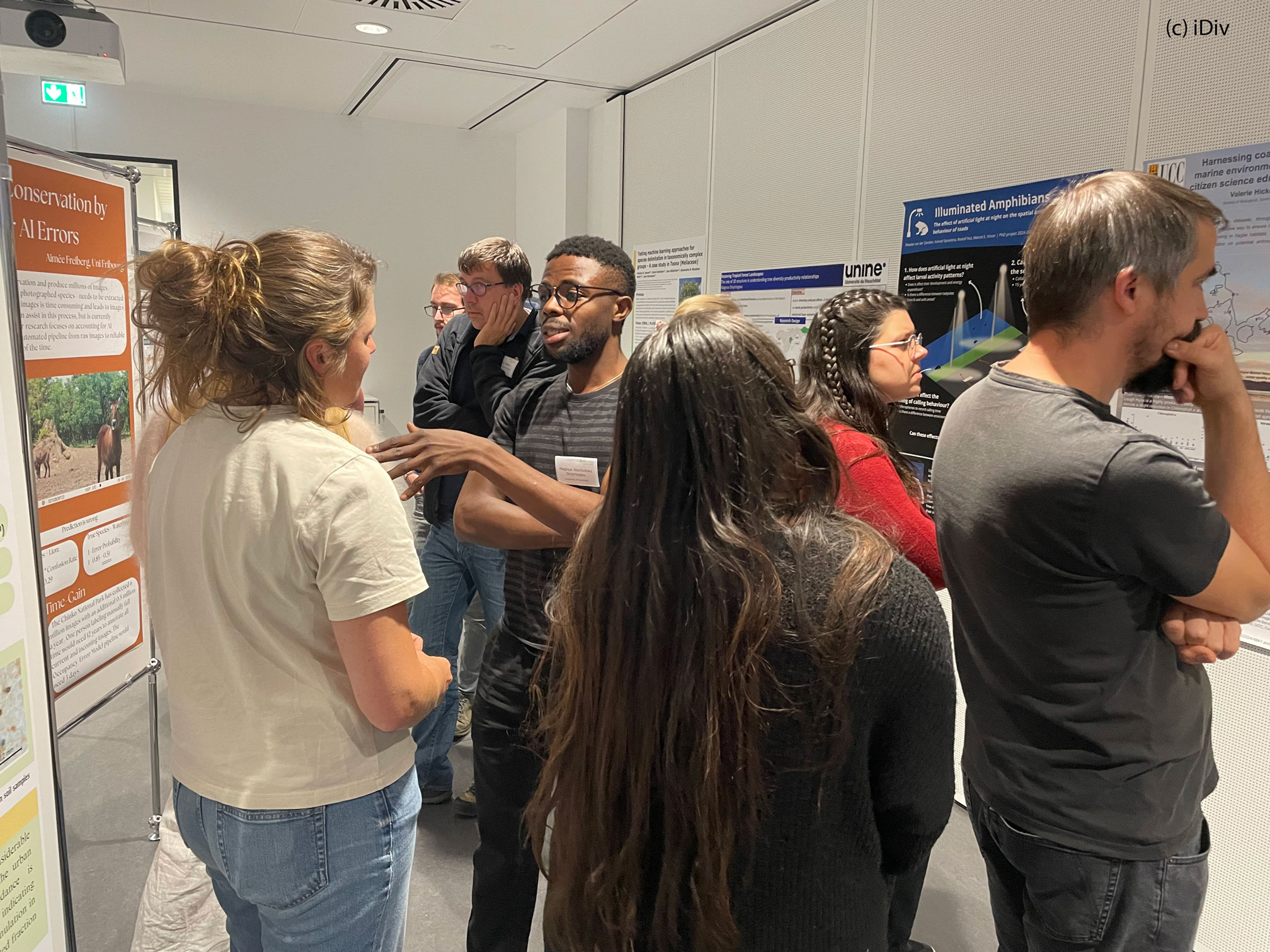“Deep Learning for Biodiversity Research and Monitoring” was the topic of this year’s iDiv Summer School. From numerous international applications, 14 early-career researchers from 12 countries were selected to join the event, which took place from 25 to 29 September at the German Centre for Integrative Biodiversity Research (iDiv) in Leipzig.
The participants – Master’s students and early-stage doctoral researchers – received a thorough introduction to key deep learning concepts and their application to biological data. The programme combined theoretical foundations in the mornings with practical lab sessions in the afternoons, where participants worked hands-on with real-world species datasets to train deep neural networks. Furthermore, a series of application talks provided insights into ongoing research projects, showcasing how deep learning is already being applied in current biodiversity studies.
In addition to the academic programme, participants enjoyed plenty of opportunities to connect and exchange ideas during social events such as the welcome BBQ in the iDiv courtyard, the “Pau Hana” gathering on Wednesday evening, and the farewell dinner at the Ratskeller in the heart of Leipzig.
This year’s Summer School was led by iDiv Members Prof Patrick Mäder and Dr Jana Wäldchen. Patrick Mäder is a Professor at the Technical University of Ilmenau, where he leads the Data-Intensive Systems and Visualisation group. He has developed extensive expertise in machine learning, software and safety engineering, and data mining. Jana Wäldchen (Max Planck Institute for Biogeochemistry in Jena) has a broad experience at the interface between biogeosciences, ecology and computer science.
They were supported by a dedicated teaching team: Dr. Ladislav Hodac, Dr. Michael Rzanny, Adity Jethliya, Sebastian Jeschke, Jonas Hüther, and Lara Kösters, who ensured high-quality instruction and hands-on support throughout the program.
We are already looking forward to organizing another iDiv Summer School next year. If you are an iDiv Member and would like to be involved, please contact us!
Contact: beate.horn@idiv.de or nicole.sachmerda-schulz@idiv.de




Testimonials
I have had some machine learning and deep learning before during my MSc programme, and feel that in one week this course has provided me with a better overview of the steps involved in deep learning networks than the whole year of my MSc! More importantly, I feel I know what questions and considerations I would need to think about when applying deep learning to my own research. The course instructors are also really lovely people, who make you feel very welcome and answer questions in great depth.
Brittany Pugh, Great Britain
It has truly been an enriching experience! Very interesting, inspiring, and it has opened my mind to new possibilities I hadn’t considered before.
My expectations were already high, but what I experienced went far beyond them. The researchers were incredibly approachable and supportive, the classes, although sometimes long, were extremely insightful and well-structured, and the participants were not only collaborative but also very friendly, which created a great environment for learning and exchange.
Sandra Santos, Universidade Federal de São Carlos, Brazil
The Summer School offered insightful lectures, a great mix of talks, hands-on learning, and engaging discussions with other participants. I learned a lot and met wonderful people from diverse backgrounds. Overall, it has been an inspiring and thought-provoking experience.
Mariana Petek, University of Buenos Aires
The summer school has provided exactly what I was hoping for: a solid introduction to how deep learning works. The modules were well-structured and tailored to ecology and biodiversity research, covering the key concepts, code organization, and model topologies needed for applying these methods in my work. I especially appreciated the morning theoretical sessions with Professor Patrick, which gave me a strong foundation in the principles of deep learning. The practical coding sessions were intense and sometimes challenging to follow as someone not fully proficient in Python, but they were equally rewarding and highly instructive.
Magnus Onyiriagwu, University of Neuchatel, Switzerland
Personally, I especially appreciated the excellent organization of the summer school. I also thought that the group of participants was well matched – everyone was friendly, open, and eager to interact. In terms of content, I particularly enjoyed the theory lectures, as they aligned most closely with what I had hoped to gain from the course.
Thank you for taking great care of everything and making this summer school an enjoyable experience!
Julia Mayr, Utrecht University